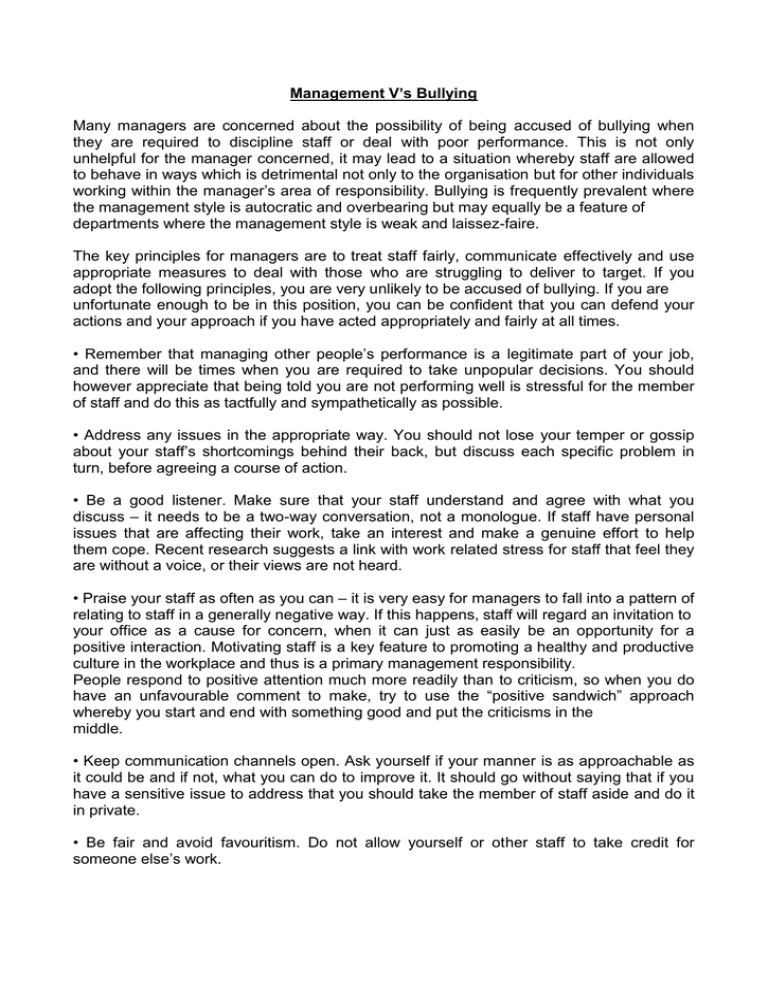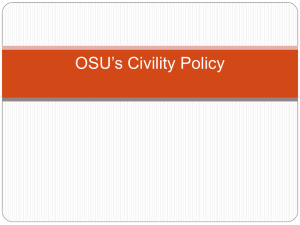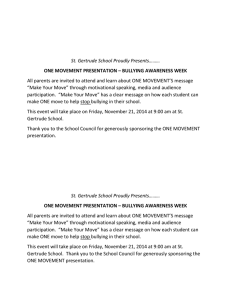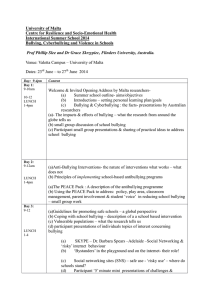Management V’s Bullying
advertisement

Management V’s Bullying Many managers are concerned about the possibility of being accused of bullying when they are required to discipline staff or deal with poor performance. This is not only unhelpful for the manager concerned, it may lead to a situation whereby staff are allowed to behave in ways which is detrimental not only to the organisation but for other individuals working within the manager’s area of responsibility. Bullying is frequently prevalent where the management style is autocratic and overbearing but may equally be a feature of departments where the management style is weak and laissez-faire. The key principles for managers are to treat staff fairly, communicate effectively and use appropriate measures to deal with those who are struggling to deliver to target. If you adopt the following principles, you are very unlikely to be accused of bullying. If you are unfortunate enough to be in this position, you can be confident that you can defend your actions and your approach if you have acted appropriately and fairly at all times. • Remember that managing other people’s performance is a legitimate part of your job, and there will be times when you are required to take unpopular decisions. You should however appreciate that being told you are not performing well is stressful for the member of staff and do this as tactfully and sympathetically as possible. • Address any issues in the appropriate way. You should not lose your temper or gossip about your staff’s shortcomings behind their back, but discuss each specific problem in turn, before agreeing a course of action. • Be a good listener. Make sure that your staff understand and agree with what you discuss – it needs to be a two-way conversation, not a monologue. If staff have personal issues that are affecting their work, take an interest and make a genuine effort to help them cope. Recent research suggests a link with work related stress for staff that feel they are without a voice, or their views are not heard. • Praise your staff as often as you can – it is very easy for managers to fall into a pattern of relating to staff in a generally negative way. If this happens, staff will regard an invitation to your office as a cause for concern, when it can just as easily be an opportunity for a positive interaction. Motivating staff is a key feature to promoting a healthy and productive culture in the workplace and thus is a primary management responsibility. People respond to positive attention much more readily than to criticism, so when you do have an unfavourable comment to make, try to use the “positive sandwich” approach whereby you start and end with something good and put the criticisms in the middle. • Keep communication channels open. Ask yourself if your manner is as approachable as it could be and if not, what you can do to improve it. It should go without saying that if you have a sensitive issue to address that you should take the member of staff aside and do it in private. • Be fair and avoid favouritism. Do not allow yourself or other staff to take credit for someone else’s work. • Make sure all members of the team are included when you organise events. This should include social activities. • Try hard not to be moody or temperamental. One of the most difficult types of behaviour to deal with for staff is that of a manager who has extreme mood swings. If you are feeling fragile, upset or simply having a bad day, don’t be afraid to let people know. A self deprecating comment is much more likely to win you sympathy and understanding than losing your temper over a trivial matter for no apparent reason. • Finally – don’t forget that everyone makes mistakes and you are no exception. No-one is perfect, so if you do get it wrong, don’t be afraid to say so. An acknowledgement and an apology are often all that are needed if you have approached an issue in the wrong way or at the wrong time or place. If you are prepared to acknowledge your mistakes, it will make it easier for your staff to do so too. This will help to establish a culture that avoids blame when things go wrong, and in which everyone pulls together with a focus on putting things right rather than finding scapegoats. The table below summarises the key differences between managers who use appropriate and inappropriate methods to get results: Good Manager Consistent Shares information Fair Truthful Delegates Builds team spirit Leads by example Bullying Manager Inconsistent Withholds selectively Has favourites Distorts and fabricates Dumps Creates fear, divides Sets a poor example











